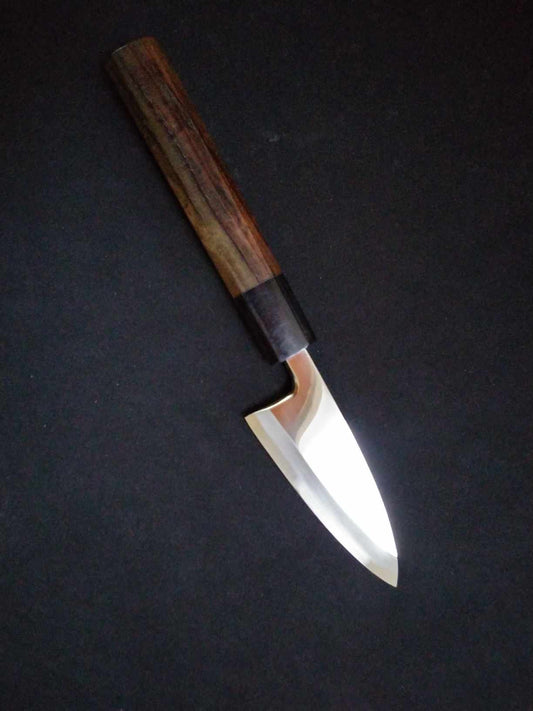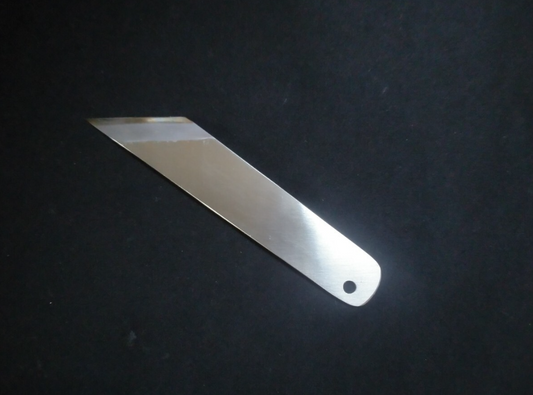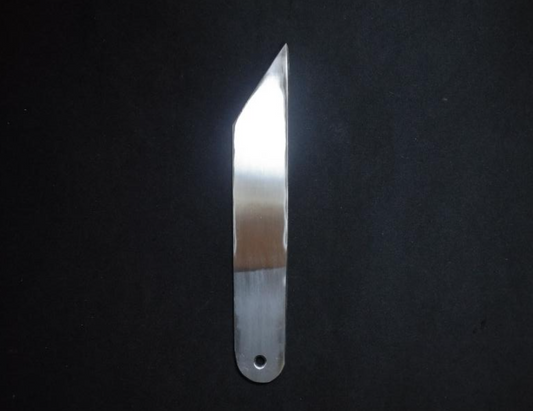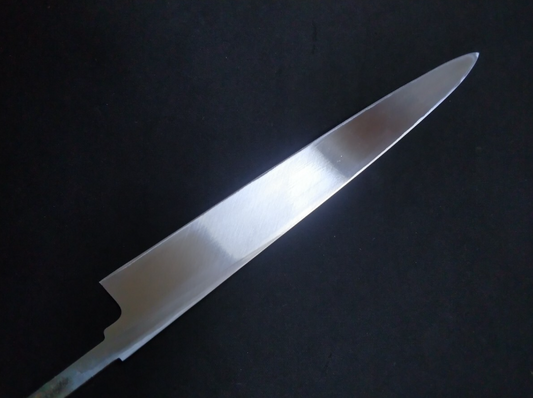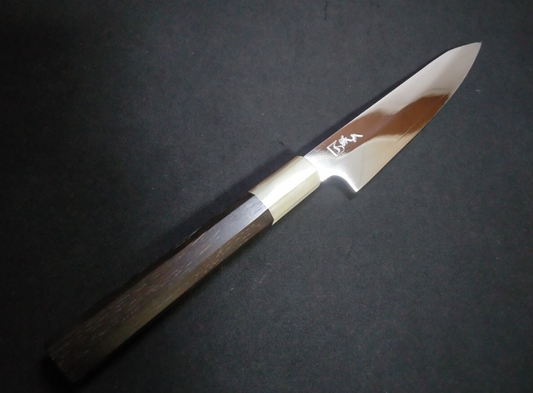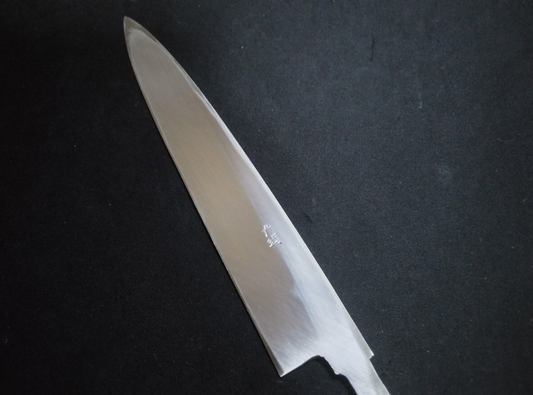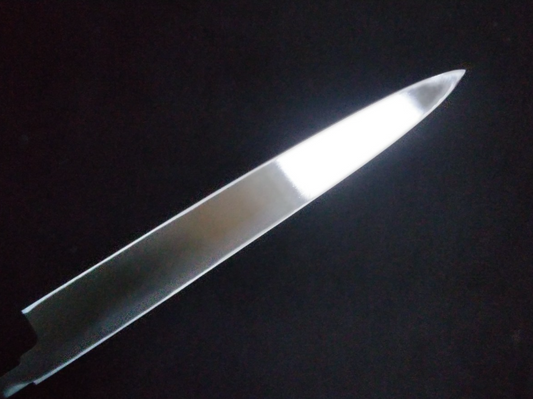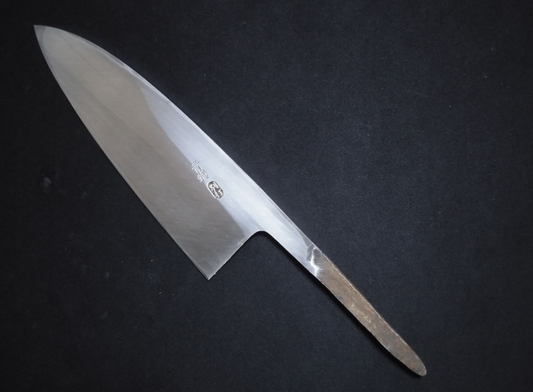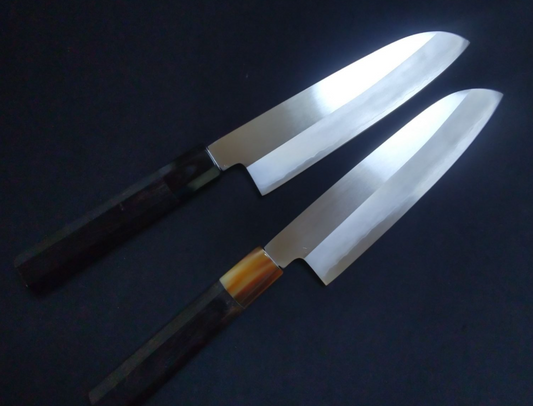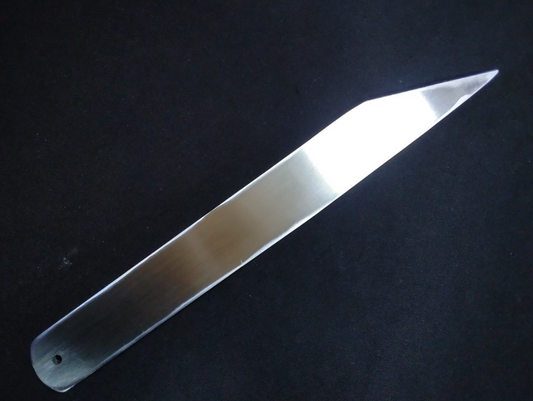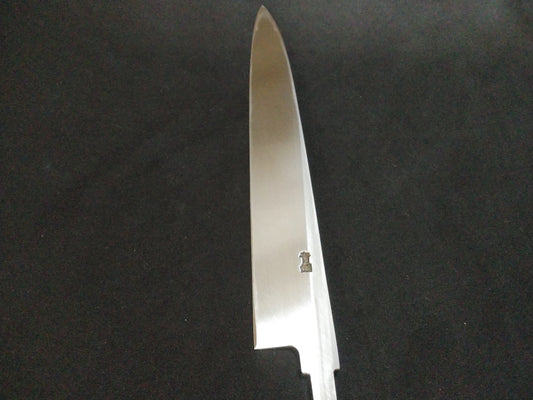
All Japanese Knives
-
-
Discover the Entire KIREAJI Collection
Experience the soul of Japanese craftsmanship with knives hand-forged in Sakai City — where 98% of Japan’s top chefs turn for their blades.
From seasoned chefs to passionate home cooks, find your perfect edge.
Tradition. Precision. Sharpness — in your hands.
-
All Japanese Knives from Sakai Collection
-
White Steel #2 KoDeba(Small Deba) 90mm-Mirror Polished(one side)
Regular price $220.00 CADRegular priceUnit price / per$0.00 CADSale price $220.00 CAD -
Blue Steel #2 Eel Knife 190mm
Regular price $240.00 CADRegular priceUnit price / per$0.00 CADSale price $240.00 CAD -
White Steel #2 Eel Knife 186mm
Regular price $250.00 CADRegular priceUnit price / per$0.00 CADSale price $250.00 CAD -

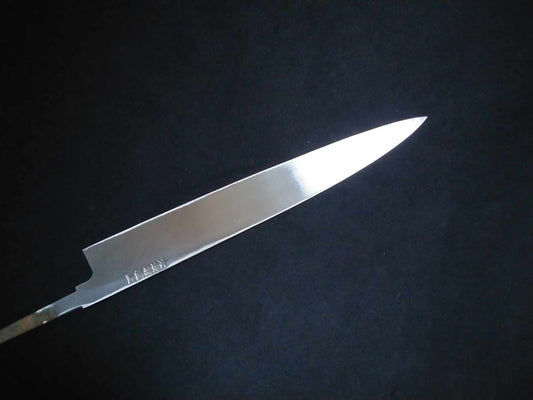 Sold out
Sold outWhite Steel #2 Yanagiba 210mm
Regular price $260.00 CADRegular priceUnit price / per$0.00 CADSale price $260.00 CADSold out -
White Steel #2 Yanagiba 240mm-Kido Finishing
Regular price $270.00 CADRegular priceUnit price / per -
Ginsan Petty 150mm -Polished (both sides)
Regular price $280.00 CADRegular priceUnit price / per$0.00 CADSale price $280.00 CAD -
Blue Steel #2 Yanagiba 210mm- Kido Finishing
Regular price $300.00 CADRegular priceUnit price / per$0.00 CADSale price $300.00 CAD -
White Steel #2 Yanagiba 270mm-Kido Finishing
Regular price $310.00 CADRegular priceUnit price / per -
Blue Steel #2 Deba 165mm- Kido Finishing
Regular price $310.00 CADRegular priceUnit price / per$0.00 CADSale price $310.00 CAD -
Ginsan Santoku 180mm-Kido Finishing
Regular price $320.00 CADRegular priceUnit price / per$0.00 CADSale price $320.00 CAD -
Super Steel (Honyaki) Eel Knife 210mm
Regular price $320.00 CADRegular priceUnit price / per$0.00 CADSale price $320.00 CAD -
Blue Steel #2 Yanagiba 240mm-Mirror Polished(one side)
Regular price $330.00 CADRegular priceUnit price / per$0.00 CADSale price $330.00 CAD

Introducing the Japanese Natural Whetstone Collection
We are pleased to present the beginning of KIREAJI’s Japanese Natural Whetstone Collection—a tribute to Japan’s enduring art of sharpening.
Our first stone marks the start of this journey, carefully selected for its beauty, texture, and exceptional performance.
Each natural whetstone is unique, shaped by nature over centuries.
As we continue to listen to our customers and artisans, we will expand this collection—adding stones that embody the spirit, refinement, and quiet strength of Japanese craftsmanship.
This is just the first chapter of a collection that will continue to grow, one stone at a time.
KIREAJI's Three Promises to You
-

1. Forged in the Legacy of Sakai
From Sakai City—Japan’s renowned birthplace of professional kitchen knives—each blade is crafted by master artisans with over six centuries of tradition. Perfectly balanced, enduringly sharp, and exquisitely finished, every cut carries the soul of true craftsmanship.
-

2. Thoughtful Care for Everyday Use
Every knife includes a hand-fitted magnolia saya for safe storage. Upon request, we offer a complimentary Honbazuke final hand sharpening—giving you a precise, ready-to-use edge from day one.
-

3. A Partnership for a Lifetime
A KIREAJI knife is more than a tool—it is a lifelong companion. With our bespoke paid aftercare services, we preserve its edge and beauty, ensuring it remains as precise and dependable as the day it first met your hand.
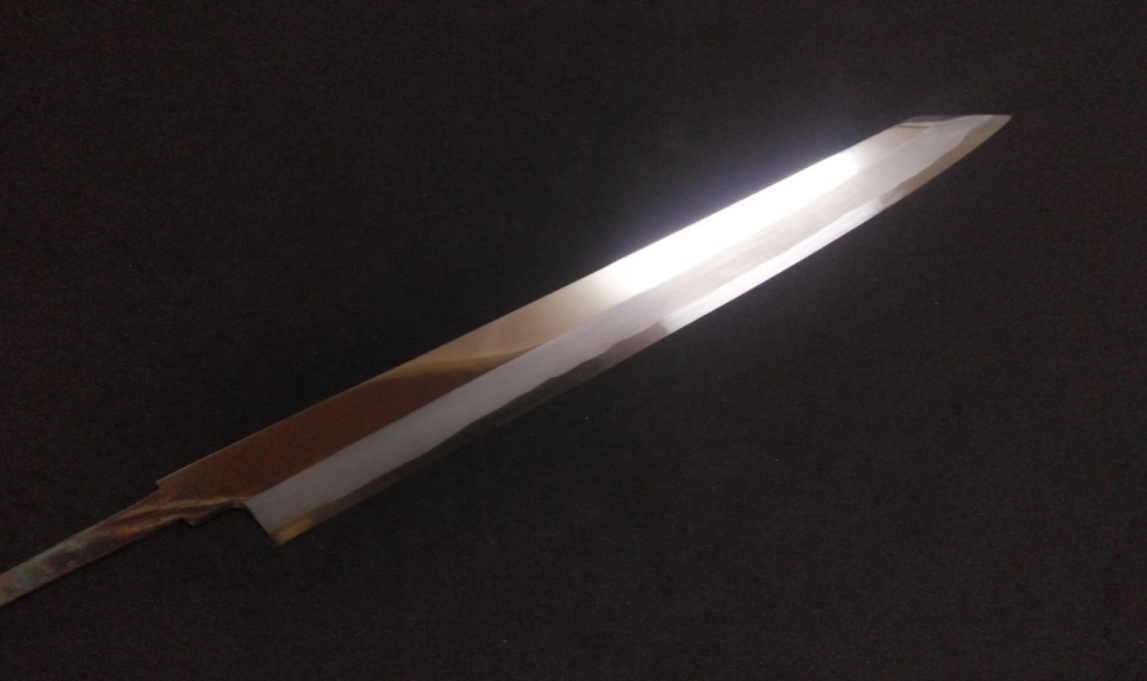
Why Many Product Photos Show Only the Blade
At KIREAJI, every knife is made to order in Sakai, Japan. Photos show the blade before the handle is attached, allowing artisans to perfect the balance and edge for your specific order. Your knife arrives fully finished — tailored just for you.

Global Delivery from Sakai
Across the world, discerning cooks seek authentic Japanese knives from Sakai — Japan’s legendary knife-making city with over 600 years of tradition.
At KIREAJI, we work alongside master artisans in Sakai to fulfill that desire, shipping genuine handcrafted knives directly from the workshop to kitchens worldwide.
Why Is Sakai City Famous for Knives?
-
From Tokyo’s Michelin-starred kitchens to family homes across the globe, one name quietly commands the respect of chefs everywhere: Sakai. This small city in Japan has spent over 600 years perfecting the art of knife-making, forging blades that combine unmatched sharpness, balance, and durability. Here’s why Sakai is more than a place—it’s a promise of culinary excellence.
-
Why Is Sakai City Famous for Knives?
The quiet capital of Japanese cutlery—trusted by professionals for centuries.
-

1. Roots that shaped a craft
Sakai’s blade-making heritage reaches back to ironworking in the 5th century, when tools were forged for the massive Kofun burial mounds near the city. By the Edo period (1603–1868), Sakai had become famous for ultra-sharp tobacco knives that even received monopoly status under the Tokugawa shogunate—launching a national reputation.
-

2. A design made for precision
Sakai codified the modern single-bevel Japanese knife: hard steel laminated to soft iron, forged and ground to acute geometry that slices cleanly without crushing texture—perfect for fish- and vegetable-centric cuisine. The craft is recognized by Japan’s government as a Traditional Craft.
-
3. Masters of one stage, working as one
Each knife passes through specialists—bladesmith, sharpener, handle maker—in a division of labor refined over centuries. This focus at every step produces blades that are razor-sharp, balanced, and durable.
-

4. Proven in professional kitchens
The Sakai Tourism Bureau reports that 98% of professional chefs in Japan use Sakai knives—a testament to performance and trust built over 600+ years.
Sakai Knives: Six Centuries of Precision, Trusted by Professionals
-
 Source (98% data): Sakai Tourism Bureau
Source (98% data): Sakai Tourism BureauFor over six centuries, Sakai has refined a craft where specialists work in perfect harmony—from forging to sharpening to handle-making. This tradition of precision is why 98% of Japan’s professional chefs trust blades born in Sakai, honoring a legacy that continues to shape the pinnacle of Japanese cutlery.
-
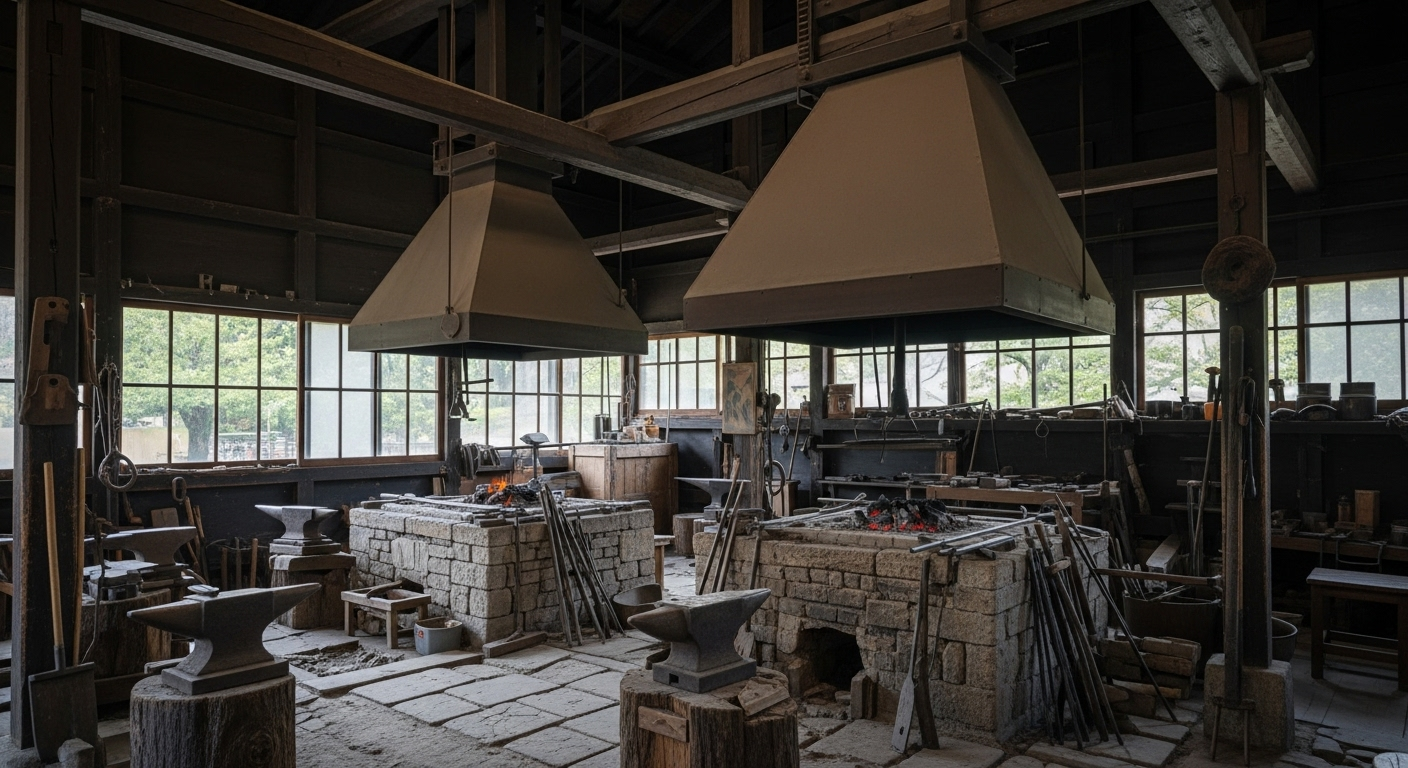
FAQ About Sakai Uchihamono (Sakai Forged Knives)
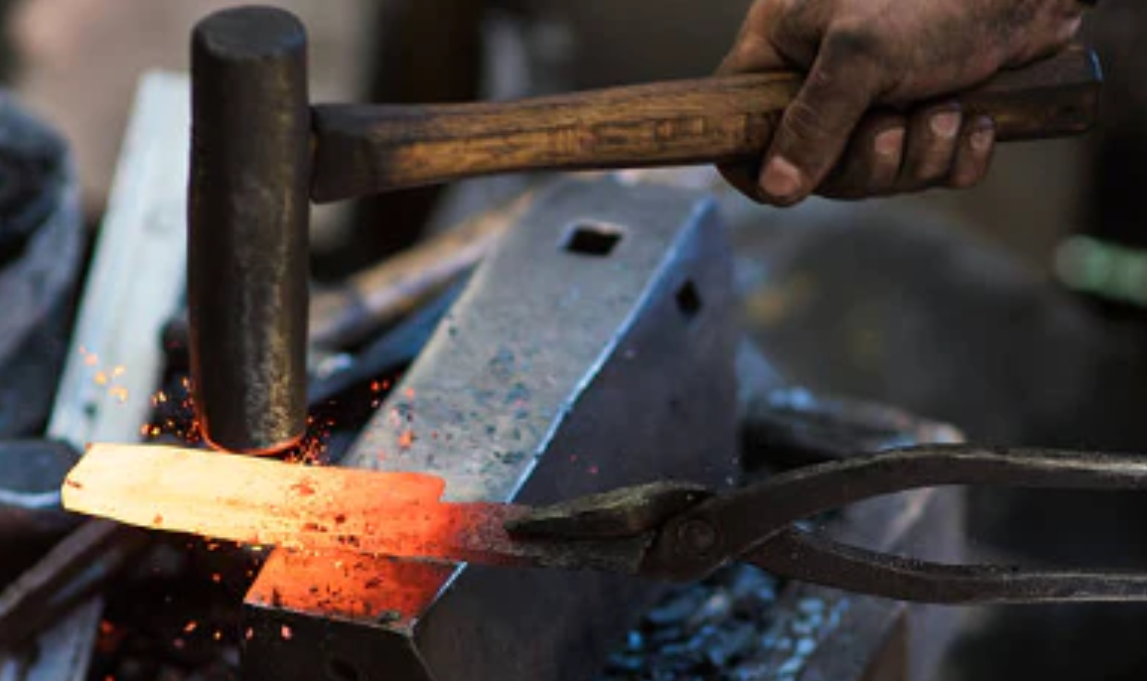
Q1. What makes Sakai forged knives special?
Sakai forged knives are renowned worldwide for their extraordinary sharpness, durability, and craftsmanship. Each blade is created through a traditional process that fuses hard steel for a keen cutting edge with soft iron for resilience, resulting in knives that are razor-sharp yet resistant to chipping. This artistry is rooted in over 600 years of history in Sakai City, where generations of master artisans have refined every step of the process—from forging and sharpening to the crafting of handles.
Q2. Why are Sakai knives so sharp?
The sharpness of Sakai knives comes from a combination of materials, design, and handcraft. By joining hagane (hard steel) with jigane (soft iron) and shaping the blade into a single-bevel edge, artisans create knives that cut with remarkable precision. This allows chefs to slice food cleanly, preserving delicate textures and enhancing flavor—an essential requirement in Japanese cuisine.
Q3. Why do professional chefs rely on Sakai knives?
In the world of Japanese cuisine, precision is essential. Professional chefs rely on Sakai knives for their unrivaled sharpness, perfect balance, and meticulous craftsmanship. Unlike mass-produced knives, each Sakai blade reflects the dedication of specialists: one artisan for forging, another for sharpening, and another for handle-fitting. This division of expertise ensures uncompromising quality.
04. What challenges does the Sakai knife industry face?
The Sakai knife industry carries centuries of tradition, but today it faces a shortage of new craftsmen. As fewer young people enter the trade, the future of these irreplaceable skills is at risk. Supporting Sakai knives is not only about owning an exceptional tool but also about helping preserve a cultural legacy.
Q5. How significant is Sakai’s presence in the knife market?
Sakai is one of Japan’s three major knife-producing regions and is particularly dominant in the professional chef market. It is estimated that about 90% of Japanese cuisine chefs in Japan use knives forged in Sakai. This overwhelming trust reflects both the historic reputation and the enduring excellence of Sakai Uchihamono.
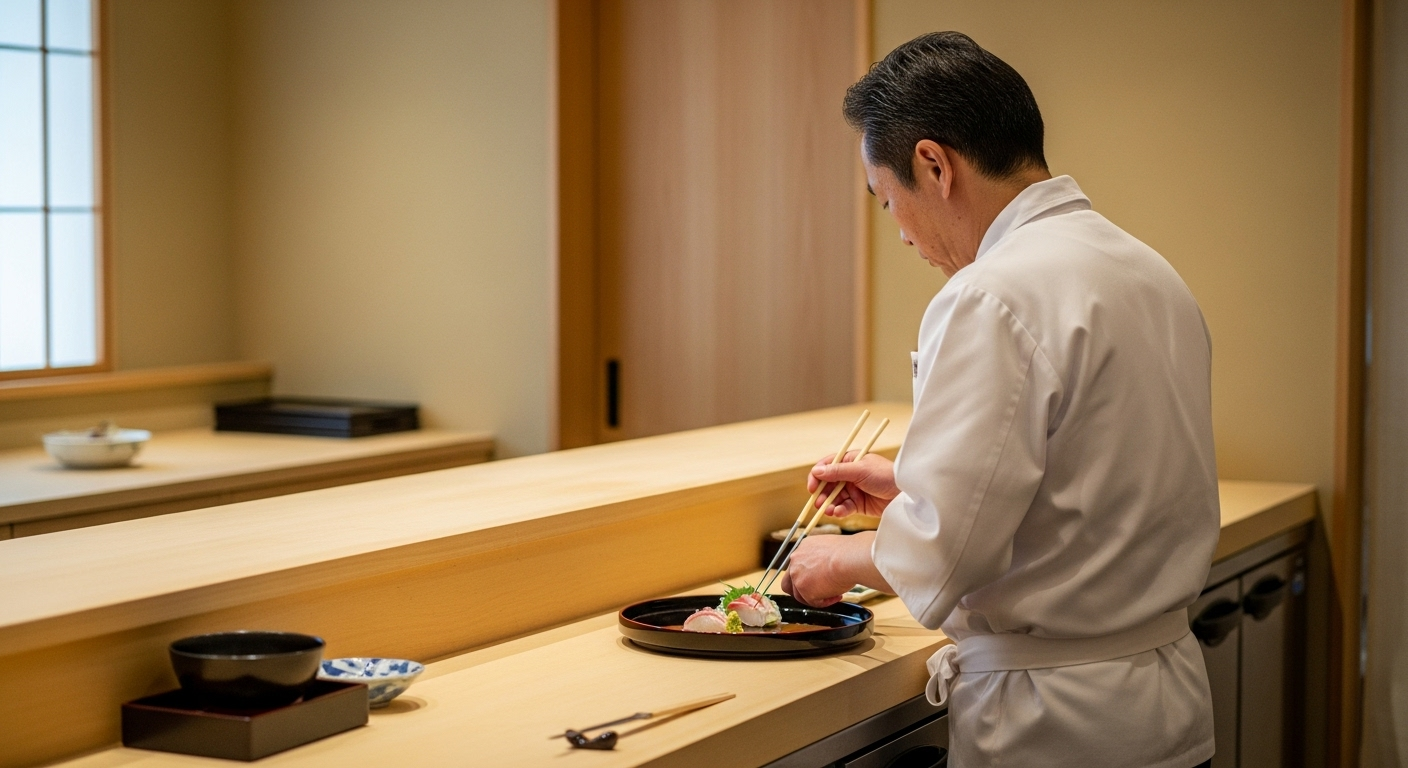
Why Do 98% of Japan’s Chefs Trust Sakai Knives?
For over 600 years, Sakai has perfected a unique craft where each stage—forge, sharpen, finish—is mastered by specialists. This tradition makes Sakai the birthplace of Japan’s most trusted knives.
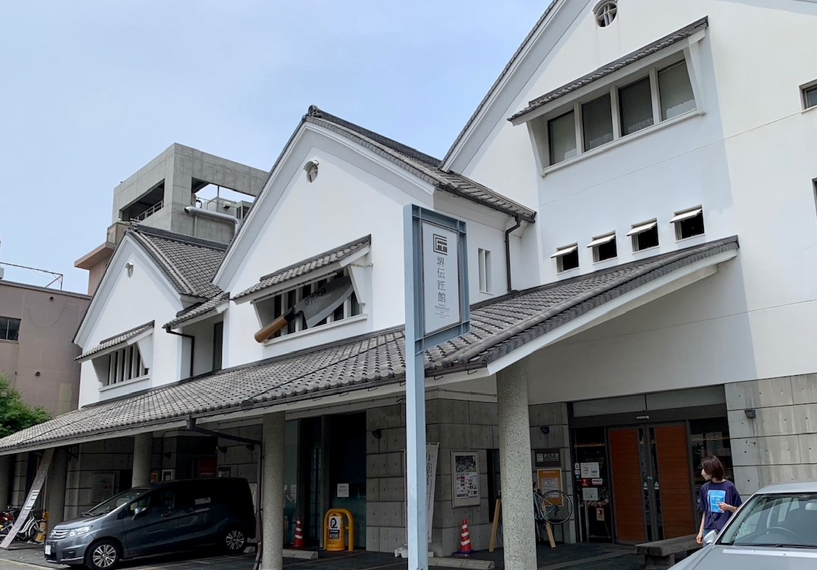
The 98% Statistic: More Than a Number
According to the Sakai Tourism Bureau, “98% of Japanese chefs use Sakai knives.” This figure isn’t just a claim—it reflects the deep trust chefs place in Sakai’s centuries-old craftsmanship.

The Master Craftsmen of Sakai Uchihamono
In Sakai, centuries-old techniques are carried forward by government-certified Traditional Craftsmen. Each knife is not just a tool but a living symbol of tradition, precision, and spirit—kept alive through their hands.

Why are Sakai Japanese knives so sharp?
The answer is not one genius craftsman, but a system that makes compromise impossible.
This article explores how specialist masters, strict accountability, and a culture of focus create sharpness with meaning—one blade at a time.

Sakai Uchihamono: 600 Years of Sharpness and Mastery
From forging to sharpening to handle making, every step in Sakai Uchihamono reflects a tradition perfected over six centuries—crafting blades renowned for their ultimate sharpness and artistry.

Sakai’s Dwindling Masters: A Legacy at Risk
Once the heart of Japan’s finest cutlery, Sakai now has only a handful of blacksmiths left. With rising competition and fading interest among the young, new markets and fresh apprentices are vital to survival. Supporting these craftsmen means safeguarding a 600-year cultural legacy.
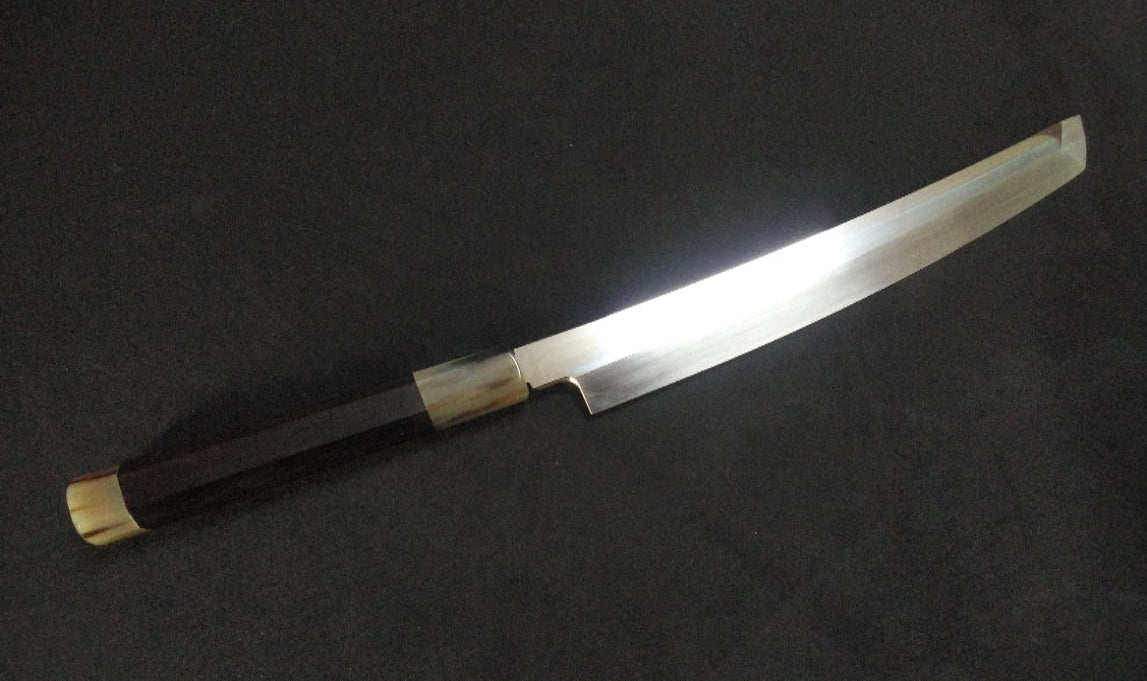
Sakai Uchihamono
Recognized as a Traditional Craft by Japan’s government in 1982, Sakai Uchihamono represents centuries of expert forging and cultural heritage from the city of Sakai.
The Soul of Craftsmanship
-
A Legacy of 600 Years Forged into Every Blade
From the blacksmithing traditions of Osaka and Sakai comes a heritage spanning over six centuries. Through generations of refinement, the form of the blade, the spirit of the steel, and the art of sharpening have reached their pinnacle. Chefs choose Sakai knives not only for their unparalleled cutting ability, but for their balance, reliability, and enduring sharpness that stand the test of time.
-
Heating, hammering, cooling, and sharpening—every step is performed by hand, with the blacksmith pouring soul and pride into the steel. This devotion gives each knife its razor edge, resilience, and character that transforms cooking into joy. By preserving this tradition and embedding it into every blade, we deliver true authenticity into the hands of chefs. This is the pride—and the promise—of Sakai’s blacksmiths.
How Japanese Knives Are Made: The Sakai Tradition
VIDEO PROVIDED: JAPAN TRADITIONAL CRAFTS AOYAMA SQUARE (YOUTUBE)
-
Sakai Forged Blades — Six Centuries of Unrivaled Craftsmanship
Loved by chefs around the world and trusted by 98% of Japan’s top culinary professionals, Sakai knives are more than tools—they are the living legacy of over 600 years of master craftsmanship.
-
At KIREAJI, we work directly with the Shiroyama Knife Workshop in Sakai, Japan, ensuring every blade is hand-forged, finished to perfection, and shipped straight from the workshop to kitchens across the globe. No middlemen. No mass production. Only authentic, artisan-made knives, crafted to elevate your cooking for a lifetime.


